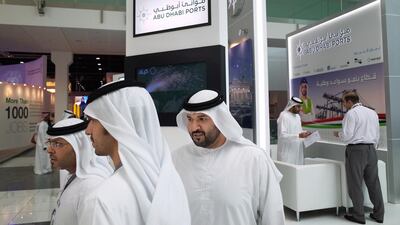ABU DHABI // A holistic approach – especially in the private sector – is necessary if Emiratisation is to be successful, human resources experts claimed on Wednesday.
Speaking on the sidelines of the Tawdheef exhibition at the HR Emiratisation Summit, they said performance was the only way for a UAE professional to grow in any organisation.
“Emiratisation can only work, if it is integrated with rest of the team,” said Nasser Al Baloushi, deputy general manager for Emiratisation and corporate affairs at Al Futtaim Group.
Mr Al Baloushi said his company made sure all professional staff were treated equally, based on performance – with all abiding by the same rules.
“You cannot engage with Emiratis only and leave the rest aside,” he said. “The days are over when Emirati professionals wanted to be treated in a special manner compared to others.”
Mr Al Baloushi added: “We are now living in 2015. We live in a country that has a multicultural foundation. We have a workforce that comes from all over the world.
“The idea of treating Emiratis differently is now gone. They have also realised that their passport may get them a job, but it is the performance alone that will make sure their career grows.”
Nadia Al Mehairi, director of the guidance department at the Ministry of Labour, said that in a competitive working environment, nationals and expatriates completed the picture together.
“Both progress and learn together. Both are the backbone of our growth and one should not feel insecure about the other,” she said.
She also emphasised improving cultural awareness among the workforce.
“Both have stereotyped images of each other. We have to bridge the gap between them.”
In the private sector, Ms Al Mehairi said, there were three types of Emiratisation processes happening in different companies across the country.
First were the companies that met the quota, second were those who were doing it for business growth without any long-term vision, and third were companies that saw Emiratisation as a means of learning together.
She said only the third category could make Emiratisation successful for the country and society, and as the UAE was an educated society, Emiratisation targeted mainly white-collar jobs.
Mouawiya Al Awad, another speaker at the summit, said that sustainability of any country was directly related to its people.
“You don’t want a model of growth only for the sake of growth,” he said. “It has to be a model of growth for the people of the UAE, and for that they have to engage with their own people.”
Mr Al Awad, the director of the Institute for Social and Economic Research, said Emiratis had to be everywhere for the security of the country.
“Nationals are more committed to their own country compared to others. Expatriates have a short-term commitment as they are here to earn money and go back. The national workforce has to be balanced. If it is not so then it may lead to security issues, not just in a physical sense but also in terms of economic security as well.”
However, he said this did not mean that all expatriate professionals should be replaced by Emiratis.
“Expatriates are also part of our country’s strength. But our strength should not become our weak point.”
Mr Al Awad also said that private companies should be fined if they were not achieving their Emiratisation targets.
“The Emiratisation quota condition should become flexible for the private companies. And those who don’t want to achieve the target can pay the money,” he said. “The Government can use that money for other development projects. It will then be a win-win situation for private companies and the Government.”
More than 200 human resource professionals from the private and public sectors attended the summit.
akhaishgi@thenational.ae

